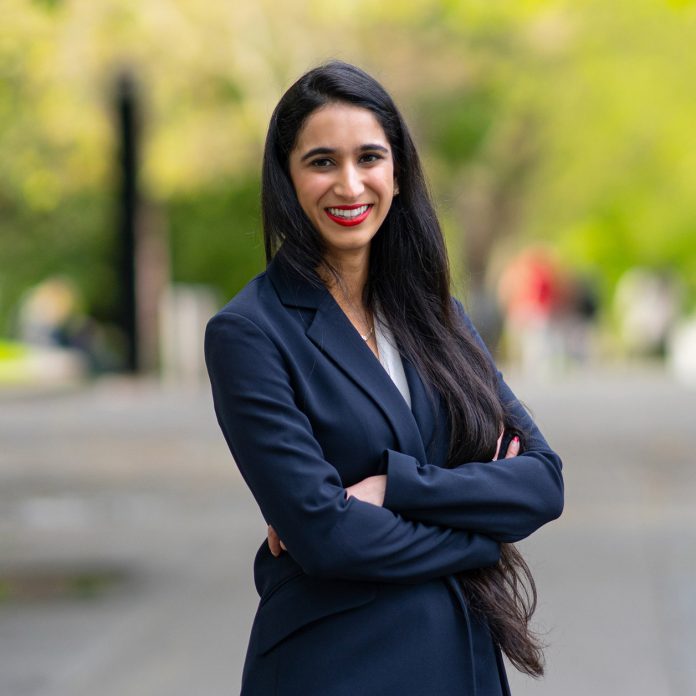Judicial challenger leads with competence, fairness, and restorative justice.
Career public defender Pooja Vaddadi is running for Seattle Municipal Court Judge against incumbent Adam Eisenberg, whose only experience with defense is as a trial attorney for Allstate Insurance.
Local court races tend to be tepid and genteel, which often obscures the differences between the candidates. Vaddadi, however, is turning heads by calling into question the incumbent’s fitness, and drawing clear distinctions with his judicial philosophy. Her platform includes competence and fairness, a clear swipe at Eisenberg’s record. And she embraces restorative justice, a compelling approach to misdemeanor crime. It hasn’t hurt her case, or the attention to the race, that Ms. Vaddadi can dazzle a zoom room with her command, charisma, and intellect.
To some readers, a municipal court race may seem a bit beyond the normal boundaries of urbanist concerns. But we can’t have dreamy pedestrianized main streets in every neighborhood and for people from every walk of life if we don’t find a way to prevent victimization and help heal those traumatized by it. If we want public spaces to act as our collective living room, they need to be safe. And if we want to achieve this without ushering in the dystopian, militarized nightmare of Dolores Umbridge and Alex Pedersen’s wildest dreams, we need to change what happens in judicial chambers.
So I decided to weigh in.
The first piece of Vaddadi’s platform is that we should expect competence from our judges. Vaddadi isn’t just playing Captain Obvious; she’s throwing shade. She’s suggesting Eisenberg is incompetent, the ultimate lawyer-slap. As an example, the campaign points to a case where Eisenberg was reversed on appeal for blatantly violating a defendant’s due process rights, (revoking a certain kind of order without holding a proper hearing), and when the higher court pushed the case back to him, Eisenberg tried to do the exact same thing again. Intransigent incompetence is a disqualifying double whammy.
Eisenberg hasn’t exactly covered himself in glory on the campaign trail either. At the Horizon House forum on September 26th, he used his closing statement to rant in the cringiest white-guy way that the judicial bench is already diverse enough. The speech appeared to be pre-planned, which raises even more serious questions about his judgment.
Vaddadi, on the other hand, oozes varsity-team vibes. Ask her a question about anything, and it’s clear she’s given the matter a great deal of thought. She can command both a room and a topic with equal alacrity. A review of her resume includes Bryn Mawr and Berkeley and a judicial clerkship. She graduated with honors at Seattle University School of Law where she now teaches in the legal writing program, ranked by peers as #6 in the country.
Next, Vaddadi says we should expect fairness from the bench. Eisenberg’s impartiality has been called into question by the many attorneys who appear before him. As Will Casey at The Stranger first reported, Judge Eisenberg has the lowest rating among Seattle Municipal Court judges for integrity and impartiality. He’s the most heavily reviewed judge, with over 100 ratings. His “unacceptable” and “below expectations” marks are ghastly two to three times as frequent as his peers.
Not only this, but it appears that a large group of professionals have reported blatantly sexist behavior by Eisenberg. The Vaddadi campaign recently released a letter noting that “fifteen individuals have approached the campaign with painful stories about suffering from or witnessing sex-based discrimation and professional misconduct by Eisenberg. It shared one personal account of “misogynist dismissal and contempt of women.” I spoke by phone with the person who wrote this account, and they were able to share more specifics. Suffice it to say, I was convinced that Eisenberg’s behavior is beyond the pale, and he shouldn’t supervise staff, much less make decisions about the course of vulnerable people’s lives.
Vaddadi, on the other hand, has chosen a virtuous vocation, which suggests she has the values this role requires. Almost anyone with a law degree will tell you that public defenders are the saints among those that take the bar. Many defendants struggle with trauma or behavioral issues, which means they aren’t always the easiest clients. Public defense offices are chronically under-resourced, and so must work on a shoestring while managing large caseloads. They are often loathed by a society that cannot imagine why a person would defend “criminals” (actually, they are defendants!). Between the way the law is written and prosecutorial discretion, prosecutors often hang something like a sword of Damocles over the necks of defendants, so public defenders also have to work with almost zero leverage or bargaining power. They take on all this disadvantage while standing between the violent power of the state and the frailty of a too-often traumatized person, usually for a poverty wage. All to say, Vaddadi’s work as a public defender shows she has the mettle and values needed to deliver a fair courtroom.
Finally, Vaddadi brings a sharp focus on restorative justice. The term is used pretty promiscuously by progressives and maligned by those who willfully misunderstand it. Restorative justice is, in short, a recognition that consequences of crime and punishment are felt throughout families and communities. Vaddadi is bold enough to include it front and center in her campaign platform.
Restorative justice works by bringing together impacted people to figure out an appropriate way to deal with the consequences of the infraction and its implications for all interested parties. The goal is to restore a healthy community by ensuring the offender takes responsibility, that interested parties determine a proper way to make amends, and that the victim’s needs are addressed.
The upshot? It works, pretty damn well. It significantly reduces the likelihood that an offender will reoffend, which makes us all safer. Offenders “have substantially higher compliance rates” and victims come out ”significantly more satisfied.” In short, restorative justice will make our city a more inviting place for civic life, something any urbanist can celebrate.
Given all this, Pooja Vaddadi is clearly the better choice for our city. She’s a cut above her opponent when it comes to competence, and her values show she will give defendants a fairer hearing than the incumbent. Her commitment to restorative justice makes us all safer and restores people to a productive place in our community. Together these show Pooja Vaddadi will stand head and shoulders above her opponent while sitting on the bench.

Ron Davis (Guest Contributor)
Ron Davis is an entrepreneur, policy wonk, political consultant, and past candidate for Seattle City Council. He is focused on making his community a place where anyone can start a career, raise a family, and age in place without breaking the bank. He has a JD from Harvard Law School and lives in Northeast Seattle with his wife — a family physician — and their two boys.

